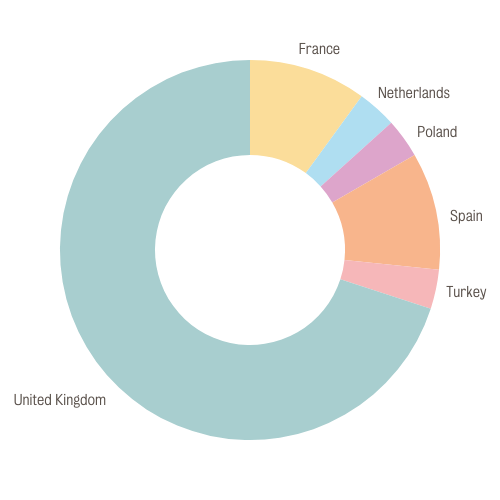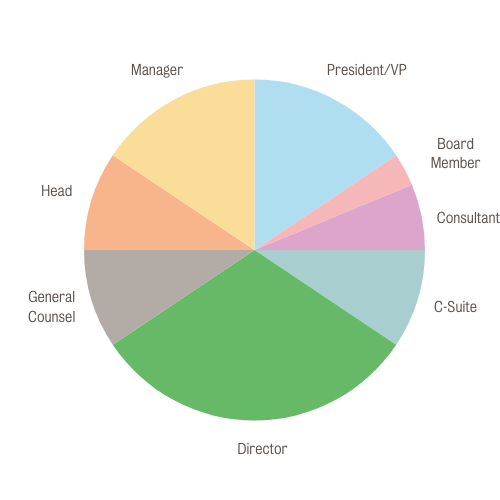Course essentials
Programme participants will be able to:
- Pilot their business through the complex and rapidly changing landscape of ESG regulation
- Design and deploy effective ESG strategies
- Energise and inspire senior executives to lead ESG transformation across the business
- Mitigate risk and unlock ESG opportunities to drive greater value in the short and long term
- Future-proof investments
- Better access green finance
- Gain state of the art knowledge on climate risk, climate finance and non-financial accounting
- Understand the science driving the climate change agenda
All graduates of the programme will receive a certificate from King's College London and will become part of the King's Business School Executive Education alumni community with access to thought leadership, events and future learning discounts. Certificates will be awarded at a graduation ceremony during the end of the programme.
Graduates of the programme will also have the opportunity to continue learning through online refresher sessions that will continue to run after the official course closes, keeping you up to date with the latest changes and innovations in the rapidly evolving sphere of ESG.
The course will cover:
| ESG 2.0 |
An overview of the science and what we mean by ESG. How ESG has evolved and is evolving, and what this means for your business. Explore the industry and personal barriers to embracing shifts in this area and how you can develop yourself and others to succeed. |
| The Spirit of Regulation and The Role of Law |
Understand the latest regulations and reporting requirements. Explore the role of law and look into the future of policy and expected developments. |
| Green Finance |
A crucial module looking at physical and transition risk, green finance and greeniums. Fully immerse yourself in the new concepts of value and learn how to avoid stranded assets. Understand best practice and, crucially, avoid the potential pitfalls lurking in non-financial accounting and integrated reporting. |
| Marketing Sustainability |
Explore the corporate and consumer views of sustainability and differences between luxury and budget segments in approaches and perceptions. Interrogate new models of consumption relevant to hospitality and delve into the warnings around greenwashing. Explore how sophisticated methods communication can drive behavioural change in consumers and stakeholders. |
| Leading Sustainable Transformation |
Deploy theories of change and cross-functional decision making to roadmap how you can lead and transform your organisation through a sustainable transition. |
| Individual project |
As part of the course you will be supported to work on your own change initiative for your business using tools, support and insights gathered from the course, giving you a tangible takeaway to implement in your own organisation and a process on which you can model future plans. |
Course dates:
- Thursday 23 January 2025 – Virtual, 8-10am UK time
- Thursday 30 January 2025 – Virtual, 8-10am UK time
- Thursday 13 February 2025 – Virtual, 8-10am UK time
- Thursday 27 February 2025 – Virtual, 8-10am UK time
- Thursday 6 March 2025 – Virtual, 8-10am UK time
- Thursday 20 March 2025 – Virtual, 8-10am UK time
- Thursday 27 March 2025 – Virtual, 8-10am UK time
- Thursday 17 April 2025 – Virtual, 8-10am UK time
- Thursday 24 April 2025 – Virtual, 8-10am UK time
- Monday 30 June 2025 – In-person, 1-7pm UK time in central London
Terms and Conditions for executive short courses.
Who can I expect in my class?
The course is designed explicitly for the leadership of the sector and you will join a selective cohort of peers driving business impact and change.
Recent class data:
Gender Split: 50% Male / 50% Female
Countries of residence:

Role types:

To find out more about the group and to discuss whether the course is right for you please free to contact the team for an informal discussion:
Ufi Ibrahim, Chief Executive of the Energy and Environment Alliance at ufi@eea.international
or
Nicole Yee, Client Relationship Manager at King’s Business School at execed-business@kcl.ac.uk
Bespoke for the industry
Responsible for 7.6% of global GDP* and employing 295 million people** the travel and tourism sector has a powerful opportunity to leave a legacy of change and leadership across sustainable business. Join your peers to shape the future of the industry and our world.
Developed for the hospitality sector this course draws on the Energy and Environment Alliance's deep and detailed understanding of the sector and King's Business School's track record in sustainability research and high-quality executive education.
This course is unique in offering the only senior executive ESG programme designed explicitly for senior leaders in the hospitality sector, bringing together investors, operators and owners. Co-created with input from workshops conducted with your peers across the world, the programme covers the breadth and depth of topics most pertinent for senior executives grappling with sustainability challenges.
* https://wttc.org/research/economic-impact
** https://www.statista.com/statistics/1268465/number-of-travel-and-tourism-jobs-worldwide/
This course is developed and delivered in partnership with the Energy and Environment Alliance (EEA). The EEA is a not-for-profit coalition of hospitality sector leaders, which is on a mission is to:
- Pioneer the first universal, scientifically robust standards and metrics for sustainable design, construction and management of hotels and other hospitality assets
- Initiate access to green finance, sustainability backed loans and improve asset values
- Obtain energy at low cost and carbon free
- Negate climate related risks and lead on environmental, social and governance (ESG) practices
- ESG-proof legal agreements, corporate disclosure, and governance statements
- Engage local authorities, government, and international institutions to ensure effective and fair legislation
- Radiate innovation, know-how and best practice
By contacting us you agree to sharing the personal data you provide with King’s College London and the Energy and Environment Alliance and to be contacted with future information on the course and relevant KCL and EEA activities. You can stop communications at any time by contacting the same email address.
The course had a profound impact on me, helping me to understand the impact on the planet, what I can do to make a difference and how I can bring my colleagues on that journey with me.
Programme Alumni - March 2024
Faculty
Dr Marc Lepere leads the course and King’s Business School’s ESG and Sustainability executive education. Marc has published in leading publications including Stanford Social Innovation Review and the Financial Times. He is also Founder and Chief Science Officer of Omnevue and has served as Chief Marketing Officer at Havas Worldwide, Executive VP for McCann Erickson WorldGroup and Deputy Chairman of Dentsu EMEA. In 2023 Marc hosted the EEA Annual Summit.
Expert module leaders and speakers on the course will include:
Professor David Aikman is Professor of Finance Practice and Director of the Qatar Centre for Global Banking and Finance. David has previously worked with the Bank of England, the Federal Reserve Board in Washington DC and the Bank of Japan.
Dr Megan Bowman is Associate Professor in Law and Director of the Centre for Climate Law and Governance in the Dickson Poon School of Law at King’s College London. Her expertise focuses on financial and corporate law in the context of climate change and planetary sustainability.
Professor Giana Eckhardt is Professor in Marketing and Vice Dean of Engagement and Executive Education at King’s Business School. She is a leading expert in the field of consumer behaviour, branding, consumer social responsibility, consumer culture and the sharing economy.
Professor Dana Minbaeva is Professor of Human Resource Management at King’s Business School. Her research on strategic international human resource management has appeared in top journals and she has led executive courses and teaching internationally. She is also founder and research partner of Nordic Human Capital Advisory ApS.
Dr Andrés Gvirtz is an Assistant Professor in Marketing Technology and Innovation at King's Business School, and a Research Affiliate at the King's Institute for Artificial Intelligence. His research aims to improve our understanding of consumer behaviour by combining personality data (who) with spatial information (where).
Read a recent article in The European from our programme leaders on companies greenhouse gas emissions reporting here (page 38).